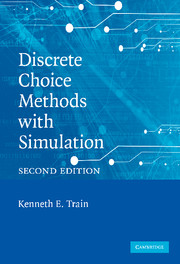5 - Probit
Published online by Cambridge University Press: 05 June 2012
Summary
Choice Probabilities
The logit model is limited in three important ways. It cannot represent random taste variation. It exhibits restrictive substitution patterns due to the IIA property. And it cannot be used with panel data when unobserved factors are correlated over time for each decision maker. GEV models relax the second of these restrictions, but not the other two. Probit models deal with all three. They can handle random taste variation, they allow any pattern of substitution, and they are applicable to panel data with temporally correlated errors.
The only limitation of probit models is that they require normal distributions for all unobserved components of utility. In many, perhaps most situations, normal distributions provide an adequate representation of the random components. However, in some situations, normal distributions are inappropriate and can lead to perverse forecasts. A prominent example relates to price coefficients. For a probit model with random taste variation, the coefficient of price is assumed to be normally distributed in the population. Since the normal distribution has density on both sides of zero, the model necessarily implies that some people have a positive price coefficient. The use of a distribution that has density only on one side of zero, such as the lognormal, is more appropriate and yet cannot be accommodated within probit. Other than this restriction, the probit model is quite general.
Information
- Type
- Chapter
- Information
- Discrete Choice Methods with Simulation , pp. 97 - 133Publisher: Cambridge University PressPrint publication year: 2009
Accessibility standard: Unknown
Why this information is here
This section outlines the accessibility features of this content - including support for screen readers, full keyboard navigation and high-contrast display options. This may not be relevant for you.Accessibility Information
- 2
- Cited by
